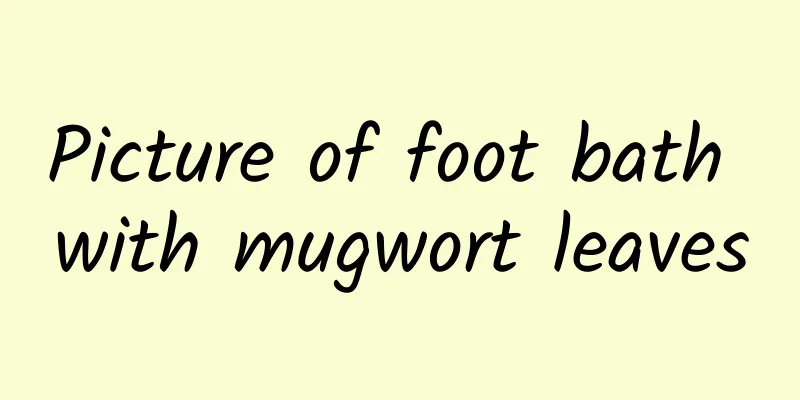Picture of foot bath with mugwort leaves

|
Mugwort leaves are a common herb in daily life. We all know that it has many functions, such as dispelling cold and relieving pain, relaxing meridians and activating blood circulation, etc. Of course, the effects of mugwort are not limited to these, it also has other functions, which are also very beneficial to the body. In daily life, mugwort leaves have many uses for us, and different uses mean different effects. So, what are the uses of mugwort? Mugwort leaves have the main use as medicine. We can dry the picked mugwort leaves, and then use them in combination with other Chinese herbal medicines to treat common diseases. Soaking your feet in wormwood leaves, safflower and ginger not only has the effect of losing weight, but also has the effect of dispelling wind and cold. Especially for female friends who are afraid of cold, soaking your feet in wormwood leaves can be used to dispel cold. Mugwort leaves can be used as spices, and we can obtain mugwort oil from mugwort leaves. The mugwort oil in mugwort leaves can be used as the raw material for eau de toilette. This kind of natural spice can not only achieve the effect of perfume, but also is safe and pollution-free. In addition, the raw materials of this type of perfume are also more cost-effective. Mugwort leaves can be used for bathing. Whether fresh or dried, they can be used to boil water for bathing. It can help the body get rid of dampness and cold. If children under the age of 18 use it for bathing, it can also remove the coldness from the body. It is worth noting that although the value of mugwort leaves is relatively low, its main uses are very wide. Mugwort leaves can also be used to make healthy drinks, and mugwort leaves can be used to make tea. And mugwort leaf tea is the best health drink for patients with slow pharyngitis. The use value of mugwort leaves is very cost-effective, and using them to make tea is also very beneficial to the body, which is really the best. Mugwort leaves can also be used for fumigation, the main purpose of which is to repel mosquitoes, because mosquitoes hate the smell of mugwort. Moreover, using mugwort to fumigate mosquitoes is not likely to cause any harm to the body. Especially in the summer when there are more mosquitoes, we should use mugwort leaves to fumigate mosquitoes. Mugwort leaves can also be used to warm the uterus. Nowadays, many women have symptoms of uterine cold. If wormwood leaves and other Chinese herbal medicines are used in combination for treatment, it can have a certain effect on uterine cold. Therefore, ladies with uterine cold symptoms can use mugwort leaves to relieve the symptoms, which is not only cost-effective, but also has better practical effects. Mugwort leaves can also be woven into folding fans, which are very popular in rural areas. They can not only be used to dissipate heat, but also help us repel mosquitoes, which really kills two birds with one stone. Therefore, in the summer, we can use mugwort leaves to weave a folding fan. Carrying it with us when going out can not only make us feel less hot outside, but also prevent mosquito bites. Mugwort leaves also have the effect of activating blood circulation. When we are accidentally injured and bleeding, we can sprinkle the wormwood leaf ash on the wound. It can not only quickly relieve the bleeding, but also protect our wound from secondary damage. Mugwort leaves also have the effect of nourishing the skin and beautifying. When we cleanse our face, we can add some mugwort leaf ash to the cleanser. After washing, you will find that your face is very clean. Moreover, if you have acne on your face, you can apply the ash of wormwood leaves on the acne. The acne on your face will quickly dry up and will not easily leave scars. What are the misconceptions about soaking your feet in mugwort leaves? Misconception 1: Everyone is suitable for soaking feet with mugwort leaves. Of course not. Patients with severe bleeding diseases should not soak their feet in hot water, such as cerebral hemorrhage or bleeding in other internal organs. For example, these patients may experience local tissue bleeding when soaking their feet in hot water. Although soaking your feet in mugwort leaves has many benefits, not everyone can do it. Wrong concept 2: You can soak your feet in moxa leaves every day, of course you can't. There is a saying that is true: All medicines are poisonous. Mugwort leaf is also a kind of Chinese herbal medicine. Long-term use of hot water foot soaking may have adverse effects on the human body. It is best to soak two or three times a week. In general, the above are the uses of mugwort and the misconceptions about using it for foot soaking. Although soaking your feet in mugwort leaves has many benefits, you still need to pay attention to whether you can use it to soak your feet, so as to avoid adverse effects on your body. |
<<: What does Ai Ye look like?
>>: Comparison chart of blackberry and Jiaogulan
Recommend
Vitamin B12
The human body needs a lot of nutrients every day...
These new rules will be implemented in December and will affect your life
Source: People's Daily WeChat (ID: rmrbwx), G...
Sad! 10 children died and 3 are still missing! It’s the peak season again…
Around 4 p.m. on June 26, Lingao County, Hainan P...
An important discovery: TRAPPIST-1 habitable planet orbit is not misplaced!
[Mobile software: Bo Ke Yuan] Astronomers using t...
The efficacy and function of half maple
Half maple lotus has the effects of relaxing musc...
One training session consumes 24 million kWh of electricity. Why does AI consume so much electricity?
Just the GPU of GPT-4 consumes 24 million kWh of ...
Let's spend a safe year together! Please check the safety guide for setting off fireworks and firecrackers
As the Spring Festival approaches, many places ac...
The Paris Olympics is about to open, and these competition venues are actually temporary?
References: [1] Liu Xiliang, Liu Yingliang. Appli...
What are the effects and eating methods of Panax notoginseng powder?
I wonder if you know anything about Panax notogin...
Effects and functions of Tripterygium wilfordii[Picture]
Modern medical research believes that the small-l...
The efficacy and function of diamond wind
There are many common Chinese medicinal materials...
Is it effective to soak Fenugreek in water?
Nowadays, more and more people use traditional Ch...
When there is a traffic jam, what is the first car doing?
The Spring Festival holiday is over and it is the...
Case solved! Scientists solve the mystery of pyramid construction: how the huge stones were transported
The Step Pyramid of Djoser, built during the Thir...
The efficacy and function of cascara
I believe many people are familiar with the Chine...









